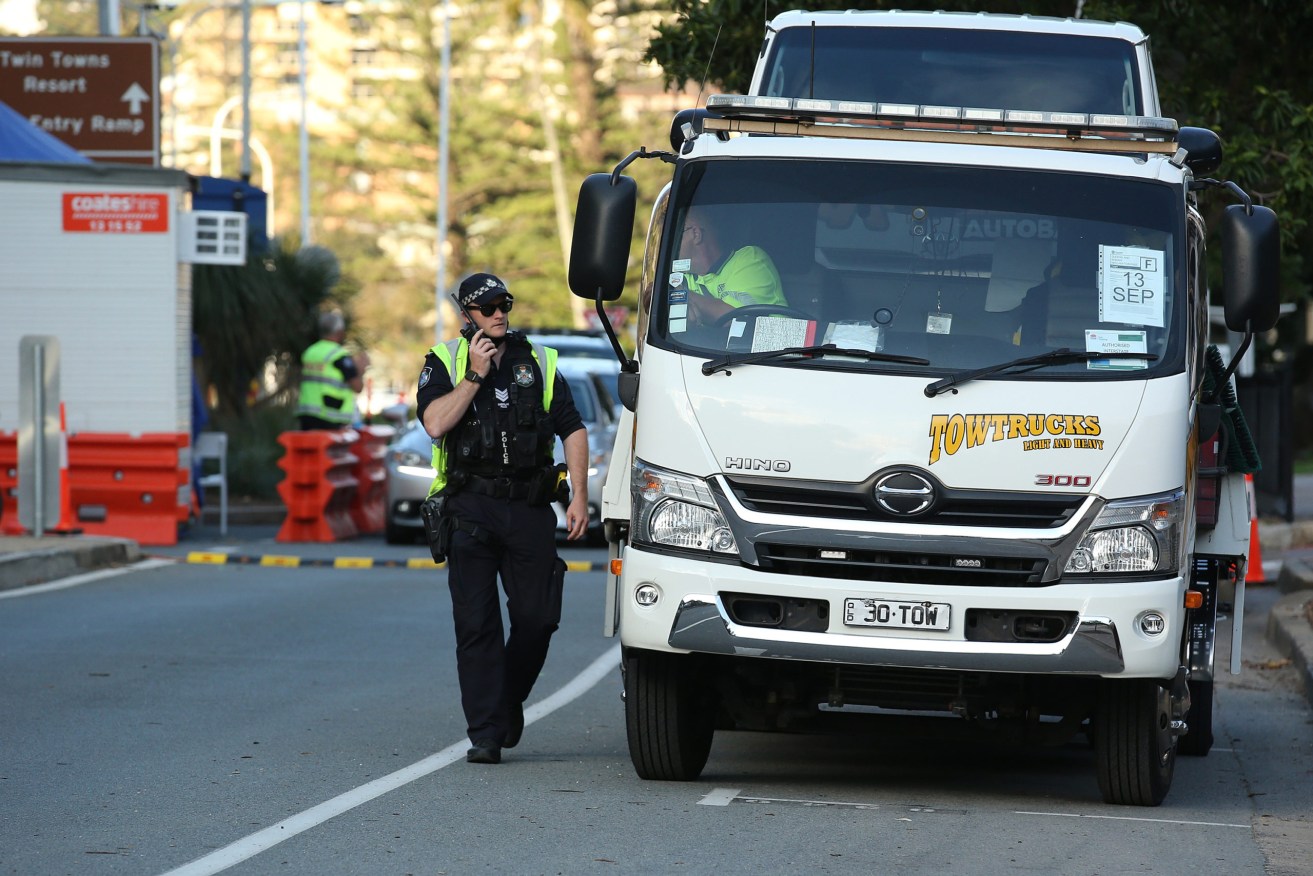Jabs still required in border bubble as Queensland guards essential workers
Even when the border bubble is reinstated on Monday, essential workers will be required to show evidence they have had at least one dose of vaccine.

Police checking cars at the Queensland-NSW border on the Gold Coast. (AAP Image/Jono Searle)
The NSW announcement that various regional local government areas would emerge from lockdown on Saturday has prompted Queensland to reinstate the border bubble with most neighbouring NSW councils from Monday. They are Tweed, Ballina, Byron, Moree Plains, Gwydir, Clarence Valley, Inverell, Glen Innes Severn, Tenterfield, Kyogle, Richmond Valley and Lismore.
The bubble will allow people to cross the border for essential work, healthcare and shopping, to care for others, and go to school, however any essential workers will need to provide evidence they have had at least one dose of vaccine. Travel further afield will still be restricted.
Chief Health Officer Jeannette Young said the vaccine requirement that currently applies to a limited number of specialist workers allowed to travel in the bubble would apply to all essential workers from Monday.
“Anyone who needs to cross the border to work, because they can’t reasonably work from home, will need to have had at least one dose of vaccine,” Young said.
“And that applies both ways.”
Under current definitions, around 1,000 workers in the bubble area are allowed to cross the border, due to having exemptions and evidence of at least one dose of vaccine. It is unclear how many other workers, not currently defined as essential, will remain locked out because they haven’t been vaccinated.
Deputy Police Commissioner Steve Gollschewski foreshadowed ongoing traffic delays – every vehicle may be checked – and said any would-be travellers should check they have the appropriate paperwork. Anyone who in the previous 14 days has been to a local government area of NSW still in lockdown will not be allowed to enter Queensland.
Deputy Premier Steven Miles said it would have come as a relief to locals that there had been no positive test results, or alarming sewage tests, given the outbreak that continues in southern states.
“We know how hard these strictest ever border arrangements have been on our border communities, both in Queensland and New South Wales, and we thank them for what they have done to keep the Delta strain out of Queensland,” Miles said.
Miles thanked Gold Coast Mayor Tom Tate for his support in reinstating the border bubble, and also his NSW counterpart, John Barilaro, who agreed it had been a difficult time for affected communities.
“This will make a difference for those communities who have done it hard,” Barilaro said.
“We know how seamless and invisible that border is, but unfortunately communities do get impacted at times when borders are closed.”
Images and vision of people gathering along a traffic border on Father’s Day prompted criticism of Queensland’s border policy and the failure by NSW to enforce the lockdown that then applied to its residents.
Sewage testing will be ramped up on the NSW side of the border, while on the Queensland side more vaccines are being sent to communities in an effort to improve the coverage rate.
The Australian Medical Association of Queensland said it was a great relief that all medical support workers were now classed as essential workers and would soon be able to resume their important work.
“When the Queensland government tightened its essential worker definition … doctors and nurses could still cross the border but orderlies, cleaners, caterers and administrative staff were shut out,” president Chris Perry said.
“This created chaos in hospitals and health care services in the Coolangatta-Tweed Heads region.
“We heard stories about surgeons having to wheel patients into operating theatres, nurses having to sterilise equipment, physios having to strip beds and GPs left with no staff to answer the phones.”
A plan discussed by National Cabinet, and based on modelling by the Doherty Institute, sets 70-80 per cent as the target range for Australia to safely open back up.
With Queensland currently out of lockdown, the only unanswered question in such an approach would be what to do with the border to NSW, particularly if southern states continue to have high case numbers and Queensland’s vaccination coverage remains patchy.
On Thursday, it was reported NSW Chief Health Officer Kerry Chant pushed for 85 per cent coverage before the state opened up, but was overruled by the Berejiklian government. Chant would not comment on the issue directly yesterday, when Premier Gladys Berejiklian announced restrictions would start to be eased from the 70 per cent mark.
The Australian Medical Association, Grattan Institute and some epidemiologists have expressed concern NSW is moving too quickly, but Chant said it was “contingent on us getting case numbers down”. Berejiklian, meanwhile, has decided to no longer front a daily press conference on the crisis.
Now, modelling done by the University of Western Australia – which has previously done work for the Queensland and WA governments – suggests 90 per cent coverage is necessary to avoid the need for harsh lockdowns and keep schools open.
The modelling found 70 per cent coverage in people eligible for vaccines (12 years and over) could be sufficient to avoid a rapidly-growing Delta outbreak but only if coupled with booster shots and early activation of moderate lockdown measures.
Queensland Premier Annastacia Palaszczuk today referenced the 80 per cent target, as she again encouraged people to get vaccinated, but would not be drawn on what might change in the state once coverage reaches that point. She insisted every eligible Queenslander should at least be offered a vaccine, something that has not yet happened due to a shortage of Pfizer.
-with AAP












